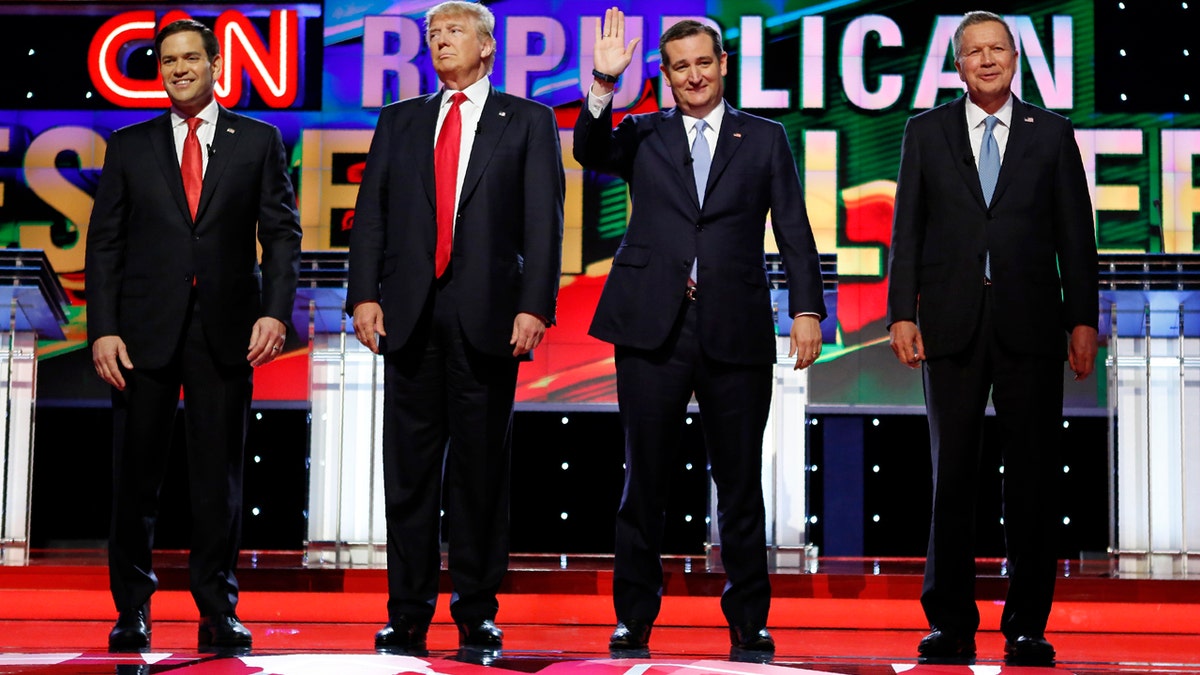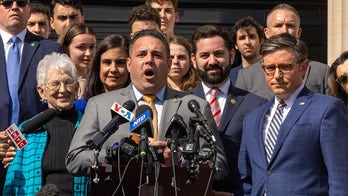
Republican U.S. presidential candidates (L-R) Marco Rubio, Donald Trump, Ted Cruz and John Kasich stand together onstage at the start of the Republican candidates debate sponsored by CNN at the University of Miami in Miami, Florida, March 10, 2016. REUTERS/Joe Skipper - RTSA9ZC
Some of the claims in the latest Republican presidential debate and how they stack up with the facts:
DONALD TRUMP: "Islam treats women horribly."
THE FACTS: No such generalization is supported by the diverse circumstances for women in the Muslim world. The United States has yet to see a woman as president, many years after Muslim women achieved national leadership in other countries, most prominently Pakistani Prime Minister Benazir Bhutto back in the late 1980s and in the 1990s.
Some Muslim societies are indeed repressive by Western standards, enforcing or pressing for norms such as clothing that covers all but their eyes or faces; bans on driving, voting and education; and restrictions on interacting with the other sex.
But in other Muslim countries, women wear Western clothes, graduate from universities, interact with men, work as Western women do, hold senior government posts and take part in competitive sports.
___
TRUMP on why he opposes Common Core: "Education through Washington, D.C. .... It's all been taken over now by the bureaucrats in Washington."
THE FACTS: Common Core is not a federal program at all, but a set of standards developed primarily by governors and education leaders in states. The standards spell out certain skills that students should grasp, while leaving how those skills are mastered up to local school districts and states.
There was no federal mandate that states adopt the Common Core State Standards. However, the federal government did encourage them, through its Race to the Top education grants that were given to states that adopted rigorous academic standards. The flip side of rewarding states that take certain steps is that it punishes states that don't.
That's the root of complaints about Washington having a heavy hand in local education. But it's a far cry from the picture painted by Trump and some other Common Core critics of a local system "taken over" by Washington.
___
TED CRUZ: "We're gonna end welfare benefits for anyone who is here illegally."
THE FACTS: It's unclear what benefits Cruz could take away. Immigrants living in the country illegally generally are not eligible for federal welfare benefits already.
To be sure, the U.S.-citizen children and spouses of immigrants who are in the country illegally are entitled to federal benefits, including food stamps and housing programs. Public hospitals are required to provide emergency medical care regardless of immigration status.
And children are also legally entitled to a free public education, regardless of their immigration status. But that's because of a 1982 Supreme Court ruling, not something a president can merely end through executive action or legislation.
___
TRUMP: Says the U.S. is getting nothing in return for its defense partnership with Saudi Arabia. "Saudi Arabia was making a billion dollars a day and we were getting virtually nothing to protect them."
THE FACTS: The U.S. has no such treaty commitment to defend Saudi Arabia, but rather a decades-long alliance. It has no troops based in the kingdom other than advisers. And it's not so that the U.S. gets nothing from the alliance: U.S. companies have received tens of billions of dollars from arms sales to the Saudis.
The U.S. did send troops to the kingdom in 1990 after Iraq's Saddam Hussein invaded neighboring Kuwait. But the Saudis reimbursed the U.S. about $16 billion for that troop presence.
___
TRUMP on U.S. military tactics against the Islamic State: "We're not knocking out the oil because they don't want to create environmental pollution up in the air."
THE FACTS: Caution about attacking IS-controlled oil wells and infrastructure in Syria is not about the U.S. armed forces going green.
U.S. military commanders say it would be a mistake to destroy an energy resource that could be preserved for whatever government emerges from the civil war. They also have acknowledged wanting to limit unnecessary side effects such as pollution.
The U.S. has conducted many airstrikes against key elements of that oil infrastructure, including oil collection facilities and distribution networks. This gradual approach has been criticized by many as being too slow, but the Pentagon contends that it has greatly reduced the militants' income.




